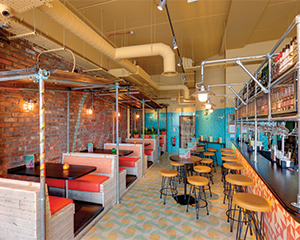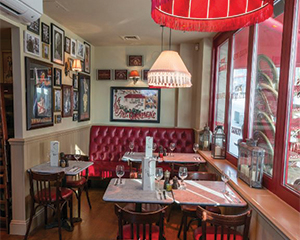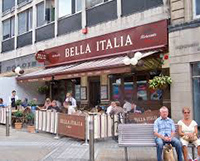
New restaurants are always alluring. In the past 12 months more than 2,000 eateries have opened in the UK. Although some will not last, there is always another concept coming along to tempt people in.
For restaurant chains that have been around for a few decades, the same old recipes will not bring in customers. Revamps are needed, money needs to be spent, and new blood added.
This is the strategy being applied by the Casual Dining Group to its portfolio of mature restaurants. CDG is the owner of Bella Italia, Café Rouge, Belgo, Oriel and, as of July, Las Iguanas – CDG paid around £90m for the 41-strong chain from private equity firm Bowmark Capital.
Bella Italia (formerly Bella Pasta), Café Rouge and Las Iguanas are all well-known names on the UK restaurant scene, having first opened after being rebranded as Bella Pasta in 1991, 1989 and 1991 respectively. In restaurant terms, this makes them almost ancient.

But the brands are now going through a transformation. Not only is the number of branches set to grow extensively, but existing properties are undergoing multi-million-pound refurbishments.
CDG was created in March, from what was Tragus Group. Last year a £220m buyout of Tragus and a restructure of the company with a consortium of investors, including Apollo Global Management, allowed the group to go on this expansion and refurbishment drive.
CDG will be spending £70m across the estate next year on refurbishments and new sites. “We will be spending £54m cash on Bella Italia and Café Rouge. On top of that, we’ll be spending around £10m on Las Iguanas,” says CDG’s chief executive, Steve Richards.
“That sort of level of commitment from our shareholders, from our business, goes hand in hand with our landlords. The CVA we did [last year] was approved by 90% of [our shareholders]… because we did it in such a way that it was a benefit to them as well as us,” he says.
Sitting in the London Kingsway branch of Café Rouge, Richards and CDG’s property director, Phil Derbyshire, talk about buying Las Iguanas, the group’s domestic and international growth plans, CDG’s launch of new brand Rapide – described as a “grab-and-go” Café Rouge (see panel) – and the opening of a food development centre with celebrated chef Alain Ducasse.
As the ragout d’escargots (snails and mushrooms in a rich sauce with truffle oil and a pastry top – £5.95) arrive, Richards explains the thinking behind acquiring Las Iguanas. “Strategically, for CDG, we were looking to buy another brand, a third growth brand, of the right size in the right market with the right characteristics.”
The right characteristics were good performance – Las Iguanas reported £4.9m of pretax profits for the year to the end of March 2014, a 13% rise on the year before – good growth prospects, and an established name. Crucially, Las Iguanas is, as Richards says, “a very flexible brand”.“It works in London, Aberdeen, Swansea, Torquay. It’s already got national coverage, proved it can work in different-sized buildings, different demographics, different locations – leisure parks, high streets, shopping centres. And those characteristics mean we think it’s very scalable. Also, it has 25 years of proven track record, which means to us that it’s another Bella Italia.”
Richards says CDG did not want a brand that fitted only in London or had limited growth. The growth plans are ambitious: Richards sees Las Iguanas going from 41 UK sites to at least 200 in the next few years, plus international expansion. Initially, it is aiming for seven new sites in the next 10 months. But the plans have market commentators worried.
One commentator says: “Given it’s taken 25 years to get to 41 sites, with just 35 sites opened in the past 12 years, there’s a potential to dilute the brand to get to the number 200 in a few years. You are probably going to do sites which Las Iguanas would have previously rejected.”
A source of comfort for the commentator is Mos Shamel, chief executive of Las Iguanas, who joined in 2003. He is staying on to join the CDG board and lead and develop Las Iguanas.
And expansion is what CDG is all about. With the arrival to the table of the plateau a partager (sharing board of charcuterie, olives, pâté, soft goat’s cheese, rocket and a selection of bread with d’lsigny butter – £12.95), Richards says: “Bella Italia is shooting the lights out at the moment. We’re going to open 23 sites this year, we have a pipeline of a further 20-odd going ahead, and we’re aiming to open circa 100 over the next few years. We believe in the growth story of Bella – it’s doing fabulously well.”
These growth locations include being inside the M25. “Some of our competitors have got many more sites than we have within that area,” says Derbyshire. “We’re well-presented in the West End and central London, but within the M25 doughnut there are too few Bella Italias. Now, whether they come out of retail leisure parks, which they may well do, or more suburban locations, time will tell.”
The company has 20 concessions in Centre Parcs and Heathrow, but are shopping centres still high on the menu? “Yes, absolutely,” says Derbyshire. “Shopping centres have their challenges in terms of potentially no leisure… after 8pm in the evening, and rents and service charges are relatively high. But if you get them right, they are guaranteed footfall.”
CDG’s biggest centre landlord is Land Securities, followed by intu.
As for Café Rouge, which is undergoing a refurbishment programme, the aim is to take it from 95 sites to around 200 in the next few years. “Café Rouge is a turnaround story,” says Richards. “It’s about reinvesting back into the brand, bringing it back to its glory years.”
Given that CDG now owns 250 familiar high street names, could they end up in competition with each other in terms of finding sites, which are all leasehold?
“Certainly I envisage a situation where there may be sites we would pass across Bella Italia and Las Iguanas and we’d make a decision then as to which is the most suitable,” says Derbyshire. “I firmly believe there will be opportunities for all three brands in the same location.” Intu’s Lakeside Shopping Centre is a classic example, says Derbyshire, where the three main brands sit together.
With the arrival of dessert – crème brûlée (£5.25) – Richards confirms that CDG is eying up more chains for takeover. “We’re looking now. We have an ambition for the company and we’re investing heavily in it, and our strategy is simple: it’s investing in the people in terms of job creation and training and development and also new roles. It’s investing in our properties, and investing in the brands.”
This further investment means the opening of a food development centre with Michelin-starred chef Alain Ducasse by the end of next year. Plus, there is the growth of Belgo – the group’s moules et bieres Belgian-themed restaurant. At present, there are five in central London.
Having just opened the fifth Belgo in Soho in July, Richards says CDG has plans to launch in Manchester, Bristol and Leeds. “Basically, we believe there’s a lot of legs in Belgo. We’ve also been approached, quite seriously, about taking it internationally.”
Then there is the launch of new concept Rapide. Richards describes it as “a new version of Café Rouge as well, which is a grab-and-go, possibly on A1 sites”. He adds: “We think there’s a market for a smaller footprint model Café Rouge, and we’re opening the first of those in October.”
As the waiter clears away the empty dishes, he brings the bill, which Richards pays: there are obviously no freebies for the owners. But, given the money the chain is ploughing into its business to expand it into becoming a dominant UK player ahead of all the new entrants, it is clear that every penny is being spent wisely. Certainly food for thought.
International expansion
The Casual Dining Group has big ambitious to take its brands abroad. “We’re expanding internationally via franchise,” says Steve Richards, CDG’s chief executive.
Having hired the former managing director of Prêt à Manger, Andrew Walker, in November 2014 to lead its franchising businesses, the group is looking at markets such as India and the Middle East.
Bella Italia is about to open in India, and the company has already opened Café Rouge in Dubai. Las Iguanas, which CDG bought in July, will also set sail abroad. Richards says: “The sort of people we’re dealing with are telling us there’s a big appetite for Las Iguanas. So those international expansion opportunities, the scalability factor, the fact that it’s clearly different out there tell us that it’s got great potential.”
CDG brands
Cafe Rouge
French-themed chain first opened in 1989 in south-west London. Has 95 branches, including four in Centre Parcs and one Heathrow concession.
Bella Italia
Started life as Pastificio before being rebranded in 1991 as Bella Pasta, and then in 2002 it transformed into Bella Italia. There are 90 in the chain.
Las Iguanas
Bought in July by CDG for a reported £90m, there are 41 Latin-themed restaurants with plans to expand to as many as 200 in the next few years, plus international expansion.
Belgo
There are five Belgos, three in London and a fourth in Bromley. The largest and best-known restaurant – Belgo Central in Covent Garden – serves more than 300,000 customers every year.
Concessions
The portfolio includes 20 concessions, at places including Heathrow and Center Parcs. The CDG also operates brasseries under the brands Huxleys, Belgo, Oriel, La Salle and Amalfi.











